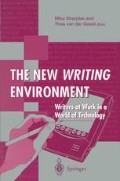Abstract
The collection of computerised functions we refer to as text processing probably accounts for the use of more machine cycles, on personal computers at least, than any other range of applications. In particular, word processing is probably the single largest application of personal computing power: yet, although computers have made it easy to put words on paper and on screens, so far they have provided very little help in ensuring that the result is high-quality, error-free text. Most users are familiar with the use of spelling checkers, and software which attempts to help the writer with grammar and style is becoming increasingly widespread; but these tools are very simple and of limited use in comparison to the kinds of skills a human proofreader brings to a text. It is no surprise that publishers still find the need to employ copy-editors.
Access this chapter
Tax calculation will be finalised at checkout
Purchases are for personal use only
Preview
Unable to display preview. Download preview PDF.
References
Dale, R. (1990). ‘A Rule-based approach to Computer-Assisted Copy Editing’. Computer Assisted Language Learning, 2, 59–67.
Douglas, S. and Dale, R. (1992). ‘Towards Robust PATR’. Proceedings of Coling-92, Nantes, France, July 1992.
Frase, L. T. (1983). ‘The Unix Writer’s Workbench Software: Philosophy’. Bell System Technical Journal, 62, 1883–1890.
Garside, R. et al. (eds) (1987). The Computational Analysis of English. London: Longman.
Haigh, R., Sampson, G. and Atwell, E. (1988). ‘Project APRIL: A Progress Report’, in Proceedings of the 26th Annual Meeting of the Association for Computational Linguistics, Buffalo, NY, June 1988, 104–12.
Heidorn, G. E., Jensen, K., Miller, L. A., Byrd, R. J. and Chodorow, M. S. (1982). ‘The Epistle text-critiquing system’. IBM Systems Journal, 21, 305–26.
Jensen, K., Heidorn, G. E., Miller, L. A. and Ravin, Y. (1983). ‘Parse fitting and prose fixing: getting a hold on ill-formedness’. American Journal of Computational Linguistics, 9, 147–60.
Jensen, K., Heidorn, G. E. and Richardson, S. D. (eds) (1993). Natural Language Processing: The PLNLP Approach. Dordrecht: Kluwer.
Kukich, K. (1992). ‘Techniques for Automatically Correcting Words in Text’. ACM Computing Surveys, 24,4,377–439.
Kwasny, S. C. and Sondheimer, N. K. (1981). ‘Relaxation Theories for Parsing Ill-Formed Input’. American Journal of Computational Linguistics, 7, 99–108.
MacDonald, N. H. (1983). ‘The Unix Writer’s Workbench Software: Rationale and Design’. Bell System Technical Journal, 62, 1891–1908.
Matheson, C. A. and Dale, R. (1993). ‘BibEdit: A Knowledge-Based Copy Editing Tool for Bibliographic Information’, in E. S. Atwell (ed.), Knowledge at Work in Universities: Proceedings of the Second Annual Conference of the Higher Education Funding Councils’ Knowledge Based Systems Initiative. Cambridge, December 1993. Leeds: Leeds University.
Nunberg, G. (1990). The Linguistics of Punctuation. Menlo Park, CA: CSLI/University of Chicago Press.
Richardson, S. D. and Braden-Harder, L. C. (1988). ‘The Experience of Developing a Large-Scale Natural Language Text Processing System: critique’, in Proceedings of the 2nd Applied Natural Language Processing Conference, 1988, 195–202.
Shieber, S. M. (1986). An Introduction to Unification-based Approaches to Grammar. Chicago, IL: The University of Chicago Press.
Vosse, Theo (1992). ‘Detecting and Correcting Morpho-Syntactic Errors in Real Texts’, in Proceedings of the Third Conference on Applied Natural Language Processing, Trento, Italy, 31st March-3rd April 1992, 111–18.
Weischedel, R. M. and Black, J. E. (1980). ‘Responding Intelligently to Unparsable Inputs’. American Journal of Computational Linguistics, 6, 87–109.
Editor information
Editors and Affiliations
Rights and permissions
Copyright information
© 1996 Springer-Verlag London Limited
About this chapter
Cite this chapter
Dale, R., Douglas, S. (1996). Two Investigations into Intelligent Text Processing. In: Sharples, M., van der Geest, T. (eds) The New Writing Environment. Springer, London. https://doi.org/10.1007/978-1-4471-1482-6_11
Download citation
DOI: https://doi.org/10.1007/978-1-4471-1482-6_11
Publisher Name: Springer, London
Print ISBN: 978-3-540-76011-5
Online ISBN: 978-1-4471-1482-6
eBook Packages: Springer Book Archive

